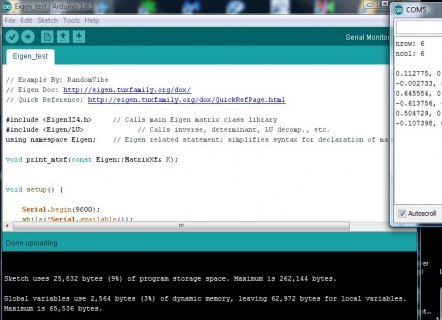// Example By: RandomVibe
// Eigen Doc: http://eigen.tuxfamily.org/dox/
// Quick Reference: http://eigen.tuxfamily.org/dox/QuickRefPage.html
#include <Eigen324.h> // Calls main Eigen matrix class library
#include <LU> // Calls inverse, determinant, LU decomp., etc.
using namespace Eigen; // Eigen related statement; simplifies syntax for declaration of matrices
void print_mtxf(const Eigen::MatrixXf& K);
void setup() {
Serial.begin(9600);
while(!Serial.available());
while(Serial.available())
{
Serial.read();
}
// DECLARE MATRICES
//--------------------
MatrixXf Pp(6,6); // Produces 6x6 float matrix class
MatrixXf H(6,6); // Note: without "using namespace Eigen", declaration would be: Eigen::MatrixXf H(6,6);
MatrixXf R(6,6);
MatrixXf X(6,6);
MatrixXf K(6,6);
MatrixXf Z(6,6);
// INPUT MATRICES (so-called comma-initialize syntax)
//---------------------------------------------------------
Pp << 0.3252, 0.3192, 1.0933, -0.0068, -1.0891, -1.4916,
-0.7549, 0.3129, 1.1093, 1.5326, 0.0326, -0.7423,
1.3703, -0.8649, -0.8637, -0.7697, 0.5525, -1.0616,
-1.7115, -0.0301, 0.0774, 0.3714, 1.1006, 2.3505,
-0.1022, -0.1649, -1.2141, -0.2256, 1.5442, -0.6156,
-0.2414, 0.6277, -1.1135, 1.1174, 0.0859, 0.7481 ;
H << 0.8147, 0.2785, 0.9572, 0.7922, 0.6787, 0.7060,
0.9058, 0.5469, 0.4854, 0.9595, 0.7577, 0.0318,
0.1270, 0.9575, 0.8003, 0.6557, 0.7431, 0.2769,
0.9134, 0.9649, 0.1419, 0.0357, 0.3922, 0.0462,
0.6324, 0.1576, 0.4218, 0.8491, 0.6555, 0.0971,
0.0975, 0.9706, 0.9157, 0.9340, 0.1712, 0.8235;
R << 0.3252, 0.3192, 1.0933, -0.0068, -1.0891, -1.4916,
-0.7549, 0.3129, 1.1093, 1.5326, 0.0326, -0.7423,
1.3703, -0.8649, -0.8637, -0.7697, 0.5525, -1.0616,
-1.7115, -0.0301, 0.0774, 0.3714, 1.1006, 2.3505,
-0.1022, -0.1649, -1.2141, -0.2256, 1.5442, -0.6156,
-0.2414, 0.6277, -1.1135, 1.1174, 0.0859, 0.7481;
// Kalman Gain Example; Matlab form: K = Pp * H' * inv(H * Pp * H' + R)
//-----------------------------------
X = H * Pp * H.transpose() + R;
K = Pp * H.transpose() * X.inverse();
// Print Result
//----------------------------
print_mtxf(K); // Print Matrix Result (passed by reference)
}
void loop() {
// put your main code here, to run repeatedly:
}
// PRINT MATRIX (float type)
// By: randomvibe
//-----------------------------
void print_mtxf(const Eigen::MatrixXf& X)
{
int i, j, nrow, ncol;
nrow = X.rows();
ncol = X.cols();
Serial.print("nrow: "); Serial.println(nrow);
Serial.print("ncol: "); Serial.println(ncol);
Serial.println();
for (i=0; i<nrow; i++)
{
for (j=0; j<ncol; j++)
{
Serial.print(X(i,j), 6); // print 6 decimal places
Serial.print(", ");
}
Serial.println();
}
Serial.println();
}


